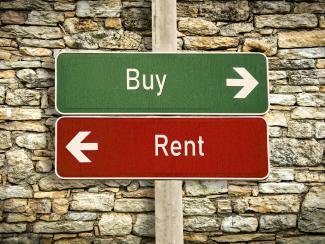
The Best Home For Your Money?
“Buying a house is the best investment you can make.”
“Stop throwing your money away on rent.”
Who hasn’t heard these pearls of personal finance wisdom? Adages like these often reflect good, old fashioned common sense, but many involving the American dream of home ownership warrant some reconsideration.
Housing is most people’s biggest expense, so the home buying decision has a major impact on our financial health. We all know people who have gotten into trouble “investing” in a home, buying too much house with too much debt. But even following traditional budgetary guidelines may be less wise than many assume.
Lenders (and even many advisors) aim for house payments (“PITI” – principal, interest, taxes and insurance) of 28% or less of gross income. Lenders also factor in a borrowers’ total debt-to-income ratio – that limit is 36%. Unfortunately, many prospective buyers, egged on by those in the business of selling real estate or mortgages, make payments based on these limits the target as they succumb to home buying fever and stretch to buy as much house as they possibly can.
I was surprised to learn these limits aren’t based on an analysis into what makes a well-balanced household budget. Instead, they’re based on what mortgage lenders have found to be the maximum payment buyers can bear without risking excessive defaults! And they know that if something goes awry people will cut most everything else before they miss a mortgage payment.
The unfortunate reality is that savings are generally the first thing to go, which may short-circuit other crucial life goals like education and retirement.
Sure, if everything goes right a fixed house payment becomes a smaller part of the budget as household income rises. But as any homeowner knows, “PITI” is just the beginning of the cost of maintaining and (eventually) renovating a home. And we all know that incomes don’t always rise, while expenses almost certainly do.
So the 28% affordability “guideline” can result in a high mortgage payment that leads to budgetary stress and, if savings are sacrificed, having too many financial eggs in one geographically concentrated, non-income producing, residential real estate basket.
But buying a home is one of the safest and best investments around, better than gambling on stocks and bonds, right? Well, the bursting of the housing bubble and resulting financial crisis showed that house prices can indeed fall. Moreover, with a few notable exceptions, returns on home ownership over the long-term have barely beat inflation.[1] In most cases you’d be better off just putting your money in a money market fund or savings account! And that’s before factoring in the costs of maintenance, taxes, insurance, furnishings, improvements etc. etc. (The best investment for beating inflation and building real wealth over the long-term is business ownership – stocks – but that’s a topic for a future post.)
Ok, so buying a home may not be a great investment, but it’s better than throwing your money away on rent, right? Maybe, maybe not. Renting is often the wiser course of action, especially in areas where real estate is very expensive and/or if you may only stay in the home less than 5 years. And in terms of throwing your money away, most people are surprised when they see what little principal they’ve paid off when they move or refinance within the first 10 years of a 30-year mortgage.
Finally, homes are not liquid assets. If your personal circumstances change, there is no guarantee you can sell as fast or for as much as you’d like.
So don’t rationalize a big home/mortgage payment by telling yourself it’s a good investment. Look at how the payments fit with your current spending and make sure you can still afford to save for retirement and other life goals. Also, don’t buy a home with too little cash on hand. Ideally, I like buyers to have no credit card debt, a fully-funded emergency fund (3-6 months’ expenses) and 25-30% of the home price in liquid assets before buying – enough for a 20% down payment and the rest for those inevitable start-up expenses that come with buying a home.
Lest you think I’m anti-home ownership, I’m not. We all need a place to live, and buying a home can have a huge positive impact on our standard of living. Financially it’s a good hedge against future housing inflation and can indeed build a nice nest egg of home equity if managed wisely. Just keep in mind it’s more a lifestyle choice than an investment, so plan carefully to keep the American dream of home ownership from turning into a financial nightmare.
[1] “The Home as a Risky Asset,” Blanchett, David M., Journal of Personal Finance Spring 2017

